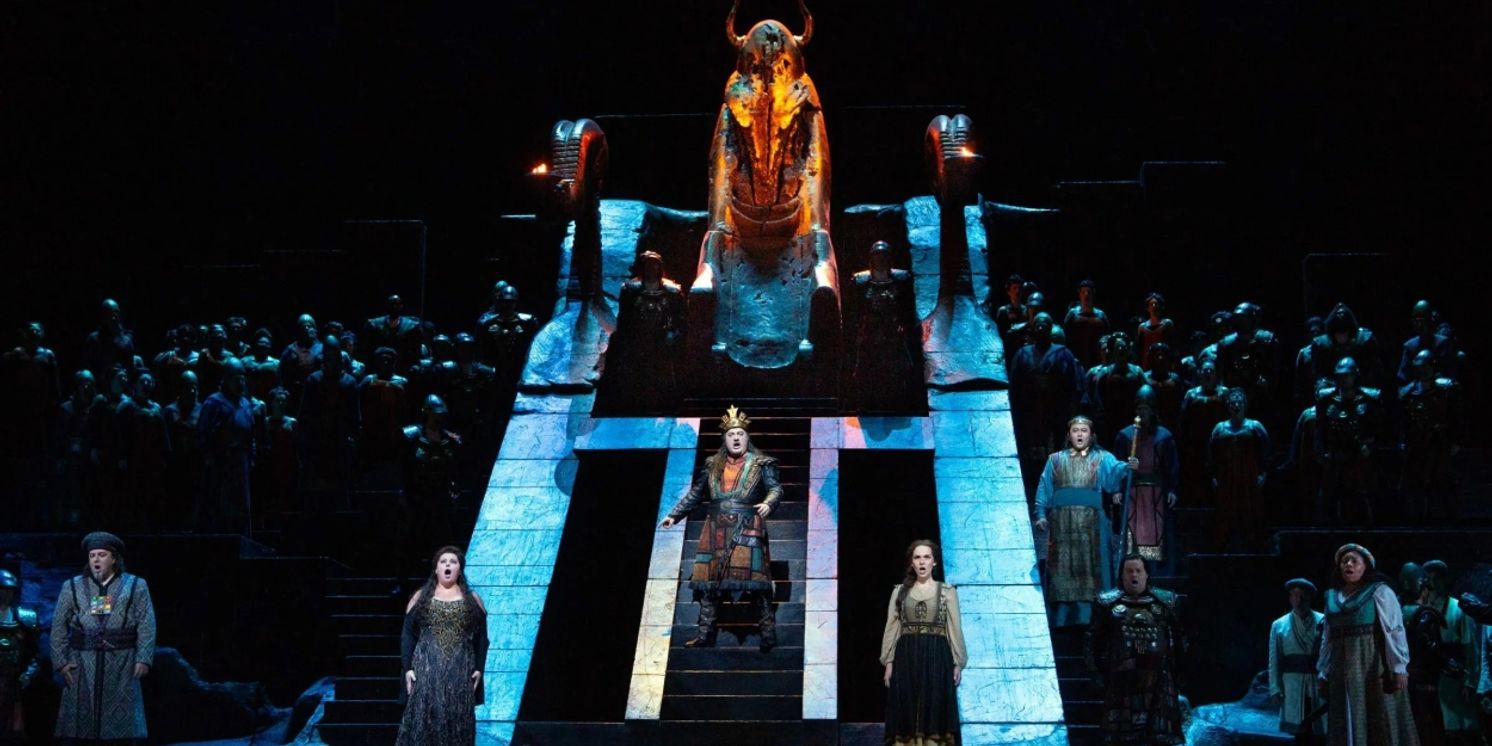Review: NABUCCO, Verdi's First Big Hit, Returns to the Met with a Terrifying Monastyrska
Under Callegari's Baton, Classic Moshinsky Production Holds Up Well with Gagnidze in the Title Role and the Met’s Great Chorus

The Met’s production of NABUCCO from Elijah Moshinsky may date back to 2001 but its style hearkens back even further--a fancy, old-fashioned unit set that uses the house’s big turntable--and it’s a whale of a show, design-wise, thanks to John Napier’s scenic design. It’s the story of the Hebrews (all, right, Jews) and their fight against the Babylonians, with a romantic angle added in the libretto by Temistocle Solera based on some books of the New Testament and a 1836 play by Auguste Anicet-Bourgeois and Francis Cornu.
Verdi’s third opera, after OBERTO and UN REGNO DI GIORNO, it was considered his first big hit (in 1842 at La Scala) but you couldn’t tell it from its track record hereabouts: It certainly didn’t take New York by storm. Its Met premiere production came during the 1960-61 season and then it took 40 years for the company to mount it a second time, though it has been revived several times since.
Under conductor Daniele Callegari, the Met orchestra--at its best with Verdi--had a strong, rich night on the third performance of opening week. The singing of the principals in the first performance of the opera this season, though, was a mixed bag, with the women, I thought, coming out on top.
The opera may be called NABUCCO (or, fully, NABUCODONOSOR), but it lives or dies by the soprano singing the role of Abigaille, who falsely thinks she’s going to take over the throne of Babylon as the illegitimate daughter of the king. (Ha!) It’s a killer of a role--a kind of heldensoprano--with some soft, beautiful singing called for along with the blistering high notes.
Soprano Liudmyla Monastyrska, in the had the chops for the two aspects of the part, as well as the physical agility to climb the towering staircase to the throne (no small accomplishment without a handrail). Her sotto voce was done with elegance and style and she certainly had the notes for some of the role’s most terrifying aspects, including the blaring music that has killed many a soprano taking on this role, though her voice could sometimes be a little harsh.
Kudos should also go to mezzo Maria Barakova, as Nabucco’s daughter Fenena, who converts as part of the love story with Ismaele (tenor SeokJong Baek, in his Met debut), nephew of the King of Jerusalem. Her lovely, warm sound made her an easy favorite with the audience. In a much smaller role, soprano Brittany Olivia Logan, as sister of the high priest Zaccaria, displayed an appealing quality.
The men were more problematic for me. Vocally, the best was tenor Baek as Ismaele, who showed off an easily likeable voice but dramatically sat on the line between dignified and stiff, though nerves could have been a factor in his debut performance.
Baritone Geoge Gagnidze was Nabucco and was fine once he warmed up, though, again, I found him dramatically unconvincing, making him less effective than was needed at important junctures, even during the period when he was mad, in “Dio di Giuda.” Bass Dmitry Belosselskiy, who I’ve admired previously, sang attractively but was missing the low notes that were particularly critical to his first aria, “D’Egitto… Come notte a sol fulgente.” (He’d sung just the night before at the Met in the Verdi Requiem.)
Although there are a number of top-drawer arias in the work, NABUCCO’s best-known number is a choral piece, "Va, pensiero, sull'ali dorate," that is much beloved and was even performed at Verdi’s funeral. (It was also performed by the Met chorus at the season opening after 9/11.) The direction of the scene showcasing this music was simple, but incredibly skillful--a highlight of the performance. The Met’s chorus sounded wonderfully graceful under Donald Palumbo, who will be retiring after this season and will be missed.
Misgivings aside, it was good to see and hear the opera again, and certainly worth attending for Monastyrska’s performance alone.
NABUCCO will be performed through January 2. For more information and tickets, please see the Met’s website.
Photo: Marty Sohl/The Met
Reader Reviews
Videos

